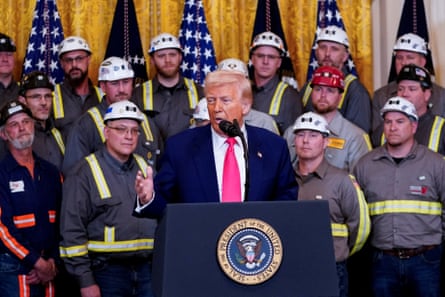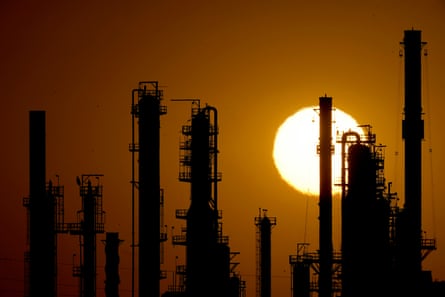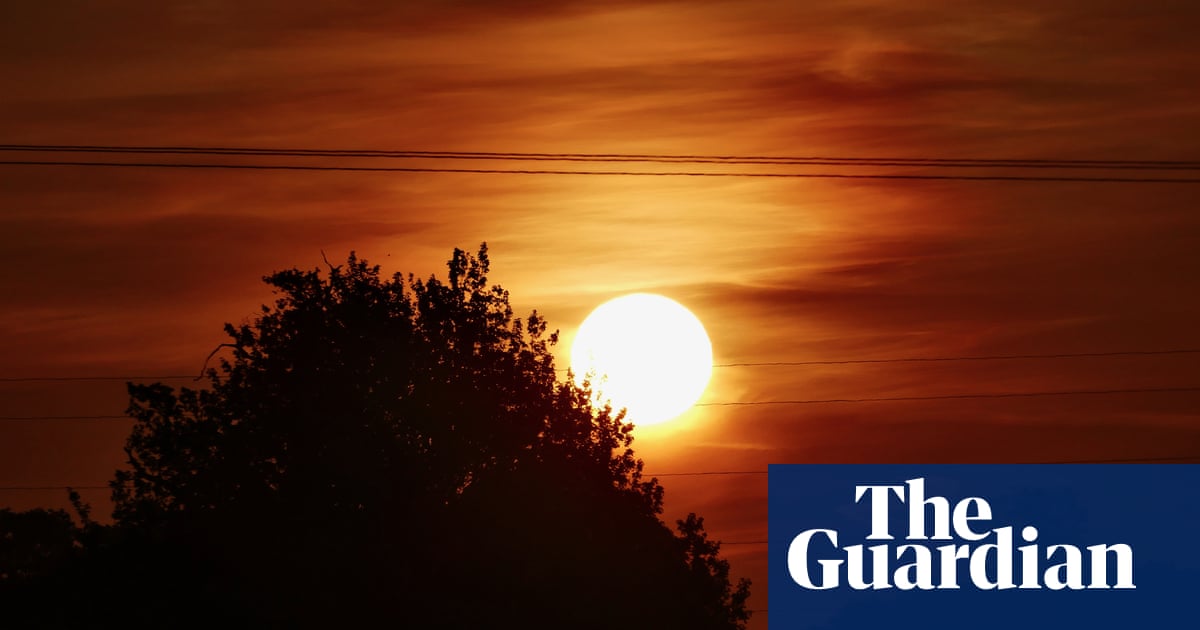Donald Trump has launched an unprecedented assault upon the environment, instigating 145 actions to undo rules protecting clean air, water and a livable climate in this administration’s first 100 days – more rollbacks than were completed in Trump’s entire first term as US president.
Trump’s blitzkrieg has hit almost every major policy to shield Americans from toxic pollution, curb the worsening impacts of the climate crisis and protect landscapes, oceans, forests and imperiled wildlife.
In all, the second Trump administration has launched 145 actions – a dizzying rate of more than one a day since the 20 January inauguration – to repeal or weaken environmental rules and escalate the use of planet-heating fossil fuels, a Guardian analysis has found. The total is derived from research by Columbia Law School, Harvard Law School and administration announcements.
While many of these initial moves are far from complete and face severe legal challenges, or years of further rule-making, the pace of the rollbacks is already set to outstrip Trump’s entire first presidency, which saw about 110 environmental rules scaled back or revoked.
“What we’ve seen in this first 100 days is unprecedented – the deregulatory ambition of this administration is mind-blowing,” said Michael Burger, an expert in climate law at Columbia University.
“They are doing things faster and with less process than last time, often disregarding the law. The intent is to shock, overwhelm and to overcome resistance through sheer force of numbers.”
Through executive orders, agency memos and other policy moves, the Trump administration has deleted a swath of Joe Biden-era green policies, frozen climate spending, removed the US from the Paris climate accords and set about rewriting pollution standards for cars, trucks and power plants.
Sprawling tracts of land, including in the Arctic, have been earmarked for new oil and gas drilling, commercial fishing will be ushered into ocean sanctuaries and half of the US’s vast expanse of national forests can now be cut down for timber. Laws to prevent harm to endangered species are set to be drastically pared back, while protected national monuments are on course to be shrunk.
Trump’s actions have often explicitly favored a fossil fuel industry that donated heavily to his presidential campaign. A start has been made in winding back rules on emissions of greenhouse gases and toxins such as mercury, as well as pipeline safety regulations.
After declaring an “energy emergency” that elides any mention of renewable energy, Trump has ordered a revival of the coal industry, exempted dozens of coal power plants from clean air rules and restarted gas exports while, conversely, blocking the approval of new solar projects and wind turbines, which he has called “ugly” and “disgusting”.
Trump has said America needs to “drill, baby, drill” for as much oil and gas, which he calls “liquid gold”, as possible. His administration is urging the extraction of fossil fuels and other minerals from all corners of the US, radically speeding up required permits and even defying the international community by opening up the Pacific Ocean’s seabed to mining. “America is sitting on a treasure trove of energy, and under President Trump’s leadership, we’re unlocking it,” Doug Burgum, Trump’s interior secretary, has said.

A White House spokesperson said that Trump was “unleashing American energy like never before – ending the Green New Scam, cutting harmful regulations, reopening offshore drilling, and approving the first LNG (liquified natural gas) project since Joe Biden’s disastrous ban last year”.
He added: “We’re achieving historic results at record speed and we’re just getting started.”
However, multiple analysts have pointed out that the US was already extracting record levels of oil and gas, producing more than it consumes and becoming a world-leading exporter of fossil fuels. The burning of these fuels is dangerously heating the planet to levels not seen during human civilization, unleashing disastrous heatwaves, floods, droughts and other worsening calamities.
Climate activists have been left aghast at the opening moves from the latest Trump White House. “Never before has an American president been so hostile to science and so beholden to fossil fuel interests,” said Jason Rylander, legal director of the Center for Biological Diversity’s climate law institute. “The scope and scale of President Trump’s assaults on protections for people and the planet is simply breathtaking.
“Every move Trump makes, from rolling back clean car standards to propping up dirty coal, takes the country and the world backwards to a time only he and his robber baron friends think was great.”
The oil industry, though, has expressed delight. “Voters sent a clear message in support of affordable, reliable and secure American energy, and the Trump administration is answering the call,” said Mike Sommers, chief executive of the American Petroleum Institute, who praised Trump for following many of the lobby group’s own stated priorities.
The haste of the administration’s environmental rollbacks has been coupled with an aggressive stance that experts say has skirted the law and is more extreme than Trump’s first term. The White House has ordered Pam Bondi, the US attorney general, to target cities and states that have implemented laws to tackle the climate crisis, while the Department of Transportation has sought to tear down New York City’s congestion charge for cars entering lower Manhattan, even though its own lawyers have expressed doubt over the legality of such a move.
Meanwhile, a sweeping Trump executive order has demanded at least 25 energy and environment laws expire next year unless they are explicitly renewed. The maximalist approach to these rollbacks, which defy norms over states’ independence and checks upon executive power, faces major legal hurdles even with a rightwing-dominated supreme court.

“Trump wants shock and awe but there are lawsuits being filed on every front that are winning,” Burger said. “Very few cases have got to the supreme court and we are seeing district and appellate courts shooting down the administration’s non-compliance with process.
“What the administration is doing is unlawful and so the most likely scenario is that they will lose. The less likely, but possible, outcome is that the system falls apart and bends to the will of one man but let’s hope that doesn’t happen because then we will be in constitutional crisis mode.”
The frantic pace of the rollbacks was exemplified on a single day on 12 March, when Trump’s Environmental Protection Agency (EPA) announced 31 actions to revise pollution standards that were on track to save 200,000 lives and even reconsider whether greenhouse gases pose a public health risk – a key finding that underpins US climate rules. Lee Zeldin, the EPA administrator, described the barrage as “driving a dagger straight into the heart of the climate change religion”.
Trump, meanwhile, has focused his presidential power upon personal fixations such as the supposed inadequacy of paper straws, which he has banned from federal offices, and the flow of water from showers, which he considers too weak. “I like to take a nice shower to take care of my beautiful hair,” Trump said at the signing of a recent executive order to eliminate a federal water efficiency rule for toilets and showers. “I have to stand under the shower for 15 minutes until it gets wet. It comes out drip, drip, drip. It’s ridiculous.”
The new shower head rule doesn’t include the standard public comment period, an example of how the administration is testing legal boundaries to speed up regulation-cutting. “Just saying ‘because I said so’ isn’t a good reason to not go through proper rule-making and it’s concerning that this is being applied to certain rules,” said Carrie Jenks, an environmental law expert at Harvard University.
Jenks said uncertainty over the attempted rollbacks is compounded by the firing of thousands of federal staff who would normally be tasked with crafting a fresh regulatory framework. “The summer will be very busy as agencies try to put words to paper on how to meet these executive orders,” she said. “If you don’t have expertise in-house to do that, it becomes that much harder.”
But the blitz upon the environment in the administration’s first 100 days may not relent during the rest of Trump’s term, Burger said, even if largely checked by the courts. “The pace of announcements may slow at some point but the pressure on our regulatory system and our democracy will not only continue but ramp up,” he said.
“The result will be fewer environmental protections and more people suffering the public health consequences of more pollution. It’s that straightforward.”

 6 hours ago
9
6 hours ago
9













































